#Sino-Vietnamese War
Text
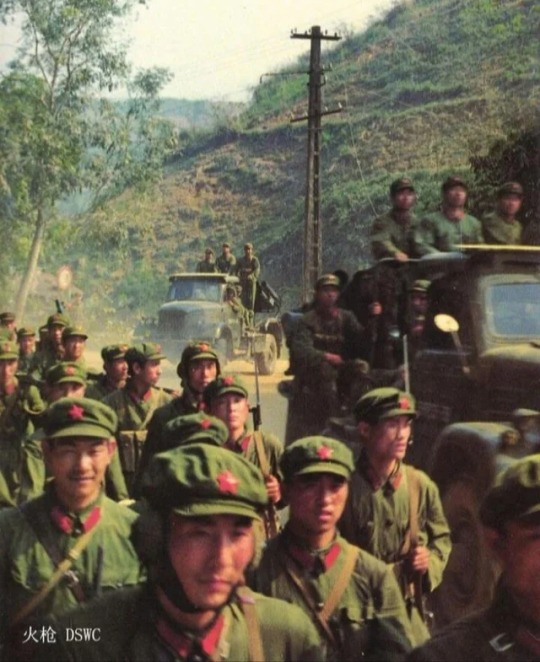
Chinese PLA invade Vietnam, 1979
51 notes
·
View notes
Text
The development history of CAT OF WAR:BACK TO VIETNAM
I had this idea at first is I was new to the scratchcn (A Chinese-based localization community) there was a third person shooter project named “CAT OF WAR VIETNAM” This project incorporates the scratch cat into the war nicely
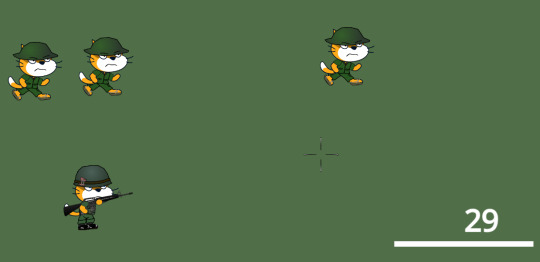
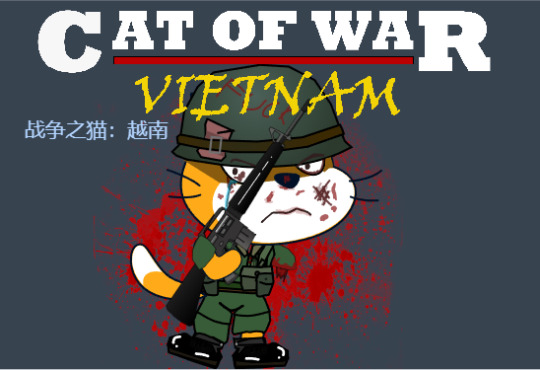
At this point I'm develop some third-person shooters incodema(It developed a development kit called “kitten” based on scratch)
At that time I saw that cat of war had great potential in the kitten engine,Because kitten has “screen capabilities”, it can be easier to develop large-scale projects with plots
So I tried to Develop a cat of war with the background of the Sino-Vietnamese War in 1979
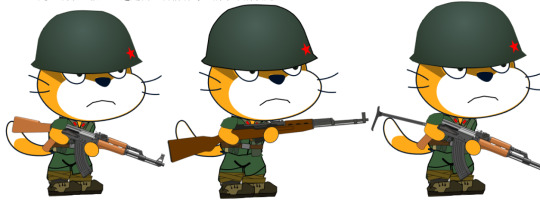
some early concept art
But in the end I gave up because I imagined developing a cat of war based on a fictional war during the Cold War
So you see the CAT OF WAR WWIII in the end。
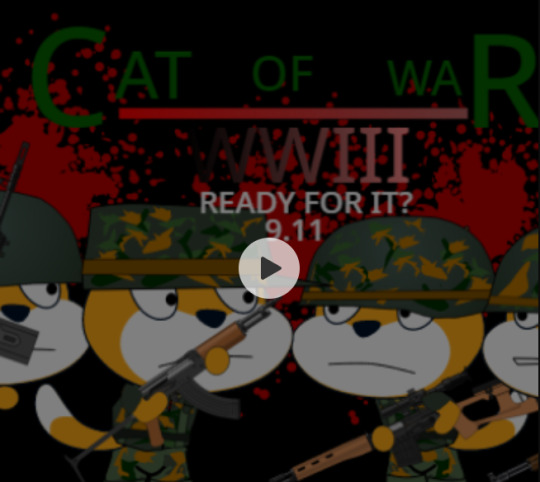

But after I ended the development of WWIII, I started working on this almost abandoned project again
I repainted the previous concept art to make it more in line with my art style
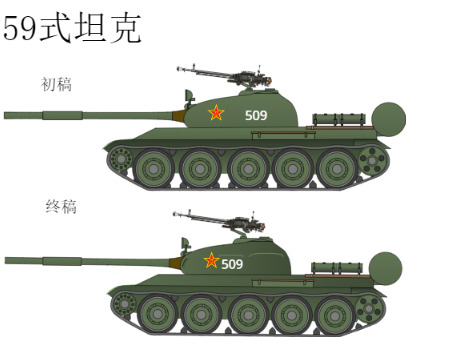

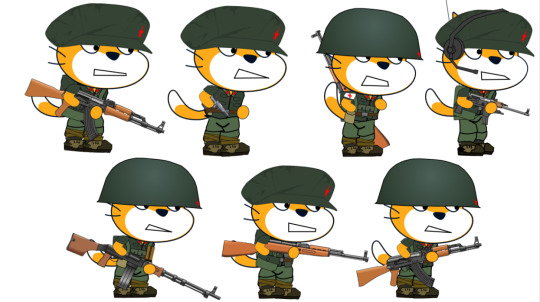
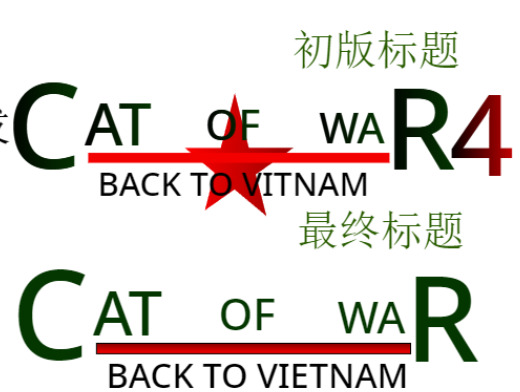
final art
Finally,the first chapter of the project has been developed
here is the scratchers also provide support during development
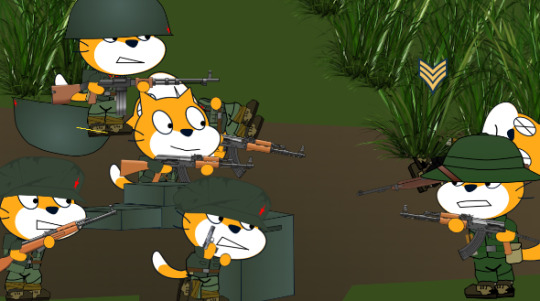
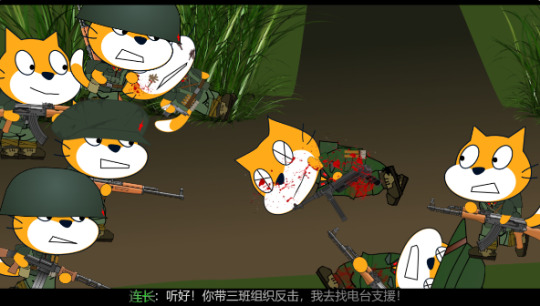
some screenshots of demo
The first half of Chapter 1 is available as a demo here
But I need some developers who have some knowledge of English to translate this project, if you want to join, please join our development channel at here
The complete project will be launch around 2024, thanks for the support!
0 notes
Text

Chinese POWs during the late 1970s Sino-Vietnamese War
1 note
·
View note
Note
Gonna be a sensitive question but as a Vietnamese what do you think about the Sino-Vietnam relationship in the past and now? From the very ancient time, the years of fighting before the crackers, the Nixon handshake in 1972, Pol Pot, border war, and the islands. I feel like the Vietnamese have good reasons to not liking everything about China, but our grievances kept being weaponized by the yankees
I'm of the opinion that the PRC had no real justification to resort to war in the fallout of the sino-soviet split. The sino-vietnamese war was, imo, more one of geopolitical/regional power play rather than one borne on marxist-leninist principles and it shouldn't have happened. So I do think Vietnam has reasonable justifications to be upset with the PRC. While there's distrust of the PRC, I'm also fairly certain most Vietnamese people wouldn't actually want to work with the usa despite what the yankees want to believe. I'm also glad that Vietnam and the PRC are moving towards closer cooperation in recent times. The recent(ish) negotiations for South China Seas dispute hotlines is a pretty big diplomatic win, for example.
Once again, the usamericans getting their dirty imperialist hands on everything always muddling the water in the region certainly doesn't help but its my hope that two socialist powers can wade through it and reach diplomatic solutions despite it.
16 notes
·
View notes
Text
Events 3.16 (after 1970)
1977 – Assassination of Kamal Jumblatt, the main leader of the anti-government forces in the Lebanese Civil War.
1978 – Former Italian Prime Minister Aldo Moro is kidnapped; he is later murdered by his captors.
1978 – A Balkan Bulgarian Airlines Tupolev Tu-134 crashes near Gabare, Bulgaria, killing 73.
1978 – Supertanker Amoco Cadiz splits in two after running aground on the Portsall Rocks, three miles off the coast of Brittany, resulting in the largest oil spill in history at that time.
1979 – Sino-Vietnamese War: The People's Liberation Army crosses the border back into China, ending the war.
1984 – William Buckley, the CIA station chief in Lebanon, is kidnapped by Hezbollah; he later dies in captivity.
1985 – Associated Press newsman Terry Anderson is taken hostage in Beirut; he is not released until December 1991.
1988 – Iran–Contra affair: Lieutenant Colonel Oliver North and Vice Admiral John Poindexter are indicted on charges of conspiracy to defraud the United States.
1988 – Halabja chemical attack: The Kurdish town of Halabja in Iraq is attacked with a mix of poison gas and nerve agents on the orders of Saddam Hussein, killing 5,000 people and injuring about 10,000 people.
1988 – The Troubles: Ulster loyalist militant Michael Stone attacks a Provisional IRA funeral in Belfast with pistols and grenades. Three persons, one of them a member of PIRA are killed, and more than 60 others are wounded.
1995 – Mississippi formally ratifies the Thirteenth Amendment to the United States Constitution, becoming the last state to approve the abolition of slavery. The Thirteenth Amendment was officially ratified in 1865.
2001 – A series of bomb blasts in the city of Shijiazhuang, China kill 108 people and injure 38 others, the biggest mass murder in China in decades.
2003 – American activist Rachel Corrie is killed in Rafah by being run over by an Israel Defense Forces bulldozer while trying to obstruct the demolition of a home.
2005 – Israel officially hands over Jericho to Palestinian control.
2010 – The Kasubi Tombs, Uganda's only cultural World Heritage Site, are destroyed in a fire.
2012 – Former Indian cricketer Sachin Tendulkar becomes the first batter in history to score 100 centuries in international cricket.
2014 – Crimea votes in a controversial referendum to secede from Ukraine to join Russia.
2016 – A bomb detonates in a bus carrying government employees in Peshawar, Pakistan, killing 15 and injuring at least 30.
2016 – Two suicide bombers detonate their explosives at a mosque during morning prayer on the outskirts of Maiduguri, Nigeria, killing 24 and injuring 18.
2020 – The Dow Jones Industrial Average falls by 2,997.10, the single largest point drop in history and the second-largest percentage drop ever at 12.93%, an even greater crash than Black Monday (1929). This follows the U.S. Federal Reserve announcing that it will cut its target interest rate to 0–0.25%.
2021 – Atlanta spa shootings: Eight people are killed and one is injured in a trio of shootings at spas in and near Atlanta, Georgia, U.S. A suspect is arrested the same day.
2022 – A 7.4-magnitude earthquake occurs off the coast of Fukushima, Japan, killing 4 people and injuring 225.
2 notes
·
View notes
Text
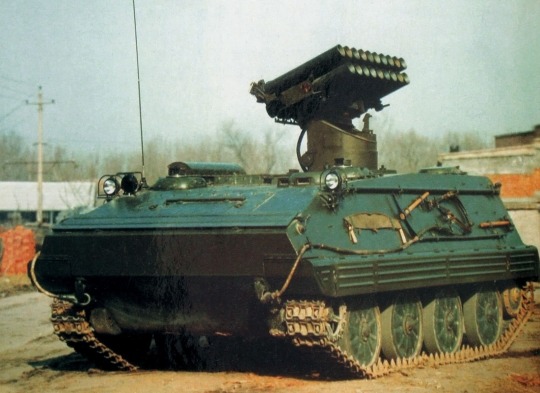
A Type 70 MLRS (Multiple Launch Rocket System), late 1980s.
The Chinese Type 70 MLRS is a rocket artillery version of the Type 63 APC, carrying 19 tubes of 130mm rockets. Development of this variant lasted about 10 months, finishing in November of 1970, with trials beginning the following year with 18 test vehicles being delivered to the 1st Tank Division of the People's Liberation Army. After receiving improvements, it would finally be named the Type 70 130 mm self-propelled rocket launcher in 1977. Mass production began in 1979 ended soon after, resulting in only 244 being produced. It most notably saw combat in Vietnam during the Sino-Vietnamese War in 1979.
Fun fact: According to Veteran recollections of this vehicle, it was used sparingly, as it cost 500 Yuan for one rocket. If the entire battalion fired all of their rockets, that is, 18 Type 70s firing 19 rockets each, it would cost well over $100,000 USD today!
2 notes
·
View notes
Text
Throughout this week, I've deeply missed my grandparents, particularly my grandfather. It's a strange feeling, but I find myself yearning for the days we spent working in the fields on our farm and savoring our sweet honey tea by the lake after dinner. Sometimes we would chat, while other times, we'd sit in silence, gazing at the stars in the sky. Occasionally, he'd sing a song, a famous Chinese tune called "Leaves from the Vine." I never understood why he sang it until one day, as tears welled up in his eyes and he looked heavenward, I couldn't help but ask him about its meaning.
With a warm smile, my grandfather began to share the story behind the song. He told me about his two sons, Su-wang and Leo Wano Zhou. Su-wang was a kind soul who became a soldier in the PLA, loved children regardless of their background, and had deep faith in the Lord Jesus Christ. He believed that helping those in need was a life well-lived. On the other hand, Leo Wano was a spoiled and ungrateful son who thought himself superior to others, a perfect blend of Yin and Yang.
My grandfather explained that when he looked at me, he saw shades of Su-wang—always cheerful, always smiling, regardless of life's challenges. Intrigued, I asked what had happened to Su-wang. With a heavy heart, my grandfather revealed that Su-wang had lost his life in the 1979 Sino-Vietnamese War at the young age of 20. The song, "Leaves from the Vine," was a way for him to honor the son he never had the chance to bury.
As we sat by the lake in a poignant silence, I contemplated the lyrics of the song. The falling leaves, so delicate and slow, symbolized the fragile nature of life, drifting to the ground. My grandfather longed for his son, taken away to fight a war that wasn't his own.
Moved by love and sorrow, I asked my grandfather why he had never spoken of Su-wang before. He replied, "Because it still hurts, my child." I rushed into the house to gather incense sticks, a bowl of nuts, and the Bible. Together, we lit the incense sticks and placed them in the ground, setting the bowl beside them. It was our way of letting Su-wang rest in peace, to honor his memory and the sacrifice he made for his country
We read Matthew 11:28-30, and even though we didn't have Su-wang's ashes, I could see the joy in my grandfather's eyes. It brought immense comfort to him to finally let his son's soul rest. But he wondered aloud, "When I am no more, who will bring honor to my brave soldier boy?" Looking at him, I made a promise, "I will, grandfather. I will bring honor to the Zhou Clan. One day, I will amaze everyone who thinks less of us, and I will bring honor to Su-wang."
He smiled at me and said, "My child, you are already the greatest gift God has blessed us with. Su-wang is proud of his niece and the remarkable young lady you have become." He continued, "I believe the Lord takes the greatest souls up to the heavens." Since that precious night, Su-wang has been a part of my daily prayers, a constant reminder of the duty I bear to honor his memory and the love I hold for my family
5 notes
·
View notes
Text
Shortlist of planned campaign settings I'd love to include in Delta Green Able Archer in no particular order:
Vietnam-Thailand-Cambodia Border (played as GRU-SV8 agents and their Vietnamese allies against the Khmer Rogue and Kuen-Yuin, 1980)
Ipswich / East Sussex (based on the Rendlesham Forest incident, possibly set in 1981 after the real world events of Christmas 1980.)
Mammoth Caves, Kentucky (general southern gothic and hollow earth shenanigans, player favorite.)
Fulda Gap, Germany (takes place during Able Archer 1983 crisis)
Hawizeh Marshes, Iran-Iraq Border (Height of the Iran-Iraq War, expect stargate hopping.)
Anchorage, Alaska (based loosely on the Robert Hansen case, where Agents will hunt the most dangerous game.)
Panjshir Valley, Afghanistan (an inversion of the Kali Ghati scenario where Delta Green agents will conduct an insurgency against GRU SV8.)
Lisbon, Portugal (unlock the secrets of the Knights Templar and their ancient, doomed war against the unnatural.)
Tokyo, Japan (Delta Green agents are forced to team up with Genyosha to investigate the rise of extreme film.)
Panama-Nicaragua Border (following the footsteps of Sub Rosa and the legacy of Delta Greens brutal history.)
Baltic States, USSR-ish (Closing the story with a last conflict between GRU-SV8 and Delta Green during the Baltic Chain protests.)
I can only do 10 of those 11 initial ideas, so I'd need to drop one. Most likely Lisbon or the Baltics campaign. The Portugal one because it can really be set in any era and I feel like it doesn't quite fit the theme of the other campaigns-- though I like it because it's different enough to be a refreshing break from the others like a nice Iberian vacation for your Agents. The one in the Baltics would tie a lot together in the end as a backdrop to a final showdown between old rivals that would be built up over the series, but the scope is big enough to make my head spin. Curious on others thoughts.
Along with these, some would have their own mini-scenarios with their own maps tacked on for oneshot "flashback" sessions to play out information revealed in-characters through some other means like reading an intelligence report or hidden tome. These are meant to be more experimental, for fun, and not meant to be fleshed out to a full campaign. That would include, potentially:
The Sino-Vietnamese border clash of 1979, playing as Kuen-Yien agents
Northern Ireland, playing as the Army of the Third Eye or
Ancient Wales playing as aspirant Knights of the Round Table (like ancient PISCES)
A Hollow Earth section in Agatha for Mammoth Caves
Land-Between-the-Lakes, Kentucky in 1955 responding to the Hopkinsville Goblin case
Kodiak Island as an Anchorage late game expansion
Playing as Knights Templar in medieval Antioch (for Portugal)
Teutonic Knights in medieval Riga (for the Baltics)
US Invasion of Grenada, 1983
Genyosha samurai uprising in Kyushu, 1887
This shits a lot, and it's going to take me a loooong time to cover it so any sourceguide drafts will be mostly outlining these settings assuming I stick with tackling all these overtime. But insight, encouragement, or especially suggestions is from fellow Agents and Handlers who listen to my rambling ass will be my bread and butter throwing this together so please, I encourage anyone to ask questions or give advice!
12 notes
·
View notes
Text
For thousands of years, Vietnam was able to successfully resist foreign invaders such as that of feudal China, and even the Mongols who for their time were almost unrivalled. In 1885, France successfully won against China in the Sino-French War and shortly after took Vietnam, Laos, and Cambodia with it and formed “French Indochina.” Shortly after France was conquered by the Nazis, this left the French in control of Vietnam in a weak position. The Japanese took advantage of this and took Vietnam under their control. The Japanese stayed in Vietnam for a further 5 years, and during this time, Comrade Ho Chi Minh returned to Vietnam to rally the Vietnamese people for national liberation. Applying what he learned in the Soviet Union and China, he formed the “Vietnam Independence League” (Vietminh). With the help of the Americans, the Vietnamese Communists lead by Ho fought against the Japanese, and once Japan was defeated in WWII, cleaning them out of Vietnam was an easy task as they were in a weakened state.
In 1946, the French came back to Vietnam to attempt to regain their colony, but after 8 years of war waged against the French colonialists, Vietnam officially defeated France in 1954, and France signed a ceasefire and officially withdrew from Vietnam. However, the battle for independence and freedom was not yet over. After the France withdrew, a puppet government was established in the South with the promise of democratic elections later on to reunite the country. However, the US knew that if these elections were carried out, the Vietnamese masses would choose communism and thus because of JFK’s theory of the domino effect, the US refused to allow democratic elections and took an active part in suppressing reunification of the country based on what the Vietnamese masses desired.
The US’ military intervention in Vietnam increased drastically after the Gulk of Tonkin incident which the US claims was an “unprovoked” attack on the USS Maddox and Turner of Joy ships. Despite those on the ship eventually coming clean to President Johnson and admitting that there were no attacks, Johnson opportunistically pushed forward with the war and eventually over 200,000 American troops were deployed onto Vietnam which officially marked the beginning of the war. The Vietnamese people applied Mao’s theory of protracted people’s war to the war against the US and successfully waged a struggle that lasted roughly 16 years. On April 30, 1975, the People’s Army of Vietnam rolled tanks into the Presidential Palace of Southern Vietnam which officially ended the war.
The US pulled its troops out shortly after as they realized that going up against the guerrilla warfare of the Vietnamese communists in a land that they were unfamiliar with was completely futile. At this time, homesickness was also getting to the troops and their effectiveness was declining exponentially. The country was officially reunified under the CPV. However, the post war era was not one of everyone enjoying socialism. Since Ho Chi Minh died in 1969, Le Duan who was an ardent revisionist took his place in the party. In 1986, Le Duan’s revisionist clique lead by General Secretary Nguyen Van Linh, who was elected shortly after Le Duan’s death 5 months prior, launched “Doi Moi” after the 6th Congress which translates to “Renovation.” These series of reforms were very similar to Deng’s China, and pretty quickly, full on capitalist restoration had occurred. Modern Vietnam as exists today still holds onto this capitalist restoration as we’ve explained in earlier parts of this interview.
— Vietnamese Maoist Speak!
4 notes
·
View notes
Text
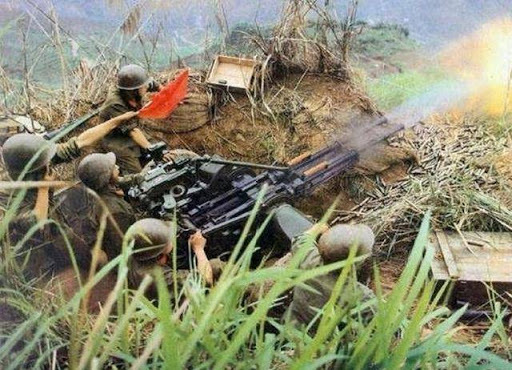
Chinese AA guns firing at Vietnamese positions, Laoshan, 1984
22 notes
·
View notes
Text
Forms of Government (Communism)
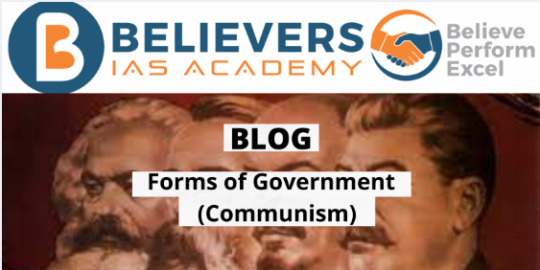
Part 3
Visit : Believers IAS Academy
Communism
Communism is a socio-political, philosophical, and economic ideology developed by Karl Marx and Friedrich Engels.
This ideology was later adapted by Lenin during the Bolshevik Revolution which allowed them to take power in Russia in 1917.
The key feature of a communist country is the lack of private property, as all the means of production are under the control of the state.
Another major feature of communist nations is their intolerance towards religion. Unlike the western nations who practice separation of church and state, communist nations often suppress organised religion and religious practices.
This comes as no surprise since the founder of communist ideology, Karl Marx himself has criticised religion saying that “Religion is the opium of the people.”
During the Cold War era, when the world became divided along ideological lines, the communist nations led by USSR became the counter to US and its allies.
Communist countries often have a one-party ruling system with the state and party being the same entity.
Currently few countries in the world have a communist form of government.
Various leaders adapted communist ideology to suit their own situations, hence communist form of government can be divided into;
Soviet Communism:
Soviet Union was the first communist country in the world as well as the leader of the communist world till its disintegration in 1991.
Soviet model of communism was developed by Vladimir Lenin and was more suited towards the needs of Russia and its people.
While Marx and Engels focused on the industrial workers and their problems in a industrialised Germany, Lenin gave equal focus on both Agricultural Labourers and Industry workers due to the semi industrialised nature of Russia in the 20th century.
Soviet Union also gave heavy emphasis in the spread of communism throughout the world and founded the Communist International or Comintern to spread communist ideology around the world.
Soviet Union also gave financial and military support to the various communist nations around the world with Warsaw Pact being the largest such grouping.
The slow speed of economic development coupled with massive spending on military caused the collapse of the Soviet Union in 1991
Chinese Communism
China is the largest and most powerful communist country in the world at present, though it has a much smaller influence around the globe.
Chinese communist ideology was developed by Mao Zedong in the latter half of the 20th century and is modified to suit the Chinese conditions.
Chinese communism gave heavy emphasis on agriculture and land reforms while little to no concern was given to the industrial workers due to China’s lack of industries.
Chinese communism also did not give much focus on developing communist ideology around the world and was more focused on China’s strategic requirements.
Due to the Sino-Soviet split, China became closer to the US from the 1960s which culminated in communist China gaining the permanent seat in UN Security Council.
China essentially left the state led economic model in the 1980s under Deng Xiaoping, which resulted in massive economic growth which propelled it to become the second largest economy in the world today.
To know more about China click here
Vietnamese Communism
Communism in Vietnam developed under Hồ Chí Minh in the 1950s and North Vietnam became a communist nation.
The entire Vietnam was united under a communist government after the end of US-Vietnam war (1955–1975).
They follow the Marxist-Leninist ideology of democratic Centralisation.
The Viet Cong, an armed communist revolutionary organization in South Vietnam, are responsible for the defeat of the US forces during the Vietnam war.
Currently Vietnam is also in the process of opening up its market to globalisation and is one of the fastest growing economies in the world.
North Korean Communism
North Korea is popularly known as the Hermit Kingdom and as such not many things are known about its socio-political situation outside the country.
The Korean communism is unique as it follows a philosophy known as the Juche which promotes national independence and development through the efforts of the popular masses.
It forms a unique mix of ultra-nationalism along with autocratic subservience to their leader and state ownership of every resource including manpower.
North Korean polity is unique amongst communist nations as they are the sole communist country which has a family serving as the de facto head of nation.
They are also the only known Necrocracy as the Supreme Leader of the country still is Kim Il-sung who died in 1994.
The North Korean state is all mighty within the country and controls every aspect of the citizens life, personal as well as public.
It is known that each North Korean citizen has only a limited number of haircuts that they are allowed to have.
They also practice conscription, and each North Korean citizen, man or women has to compulsorily serve in the armed forces.
Other Communist nations such as Cuba or Laos maintain similar political structure and they are also in various stages of opening their economy.
India also has communist parties as mainstream such as Communist Party of India and Communist Party of India (Marxist).
The Naxalite insurrection is also following communist ideology and is often said to receive funding from China.
To know more about Absolute Monarchy click here
#iasexam#ias coaching#iaspreparation#IAS officer#iasaspirant#iascoaching#ias academy#UPSC#Upscexam#upsccoaching#upscmotivation#upscaspirants
2 notes
·
View notes
Text
youtube
How the Sino-Vietnamese war helped China kick-start China-US relations and economic reforms
China attacked Vietnam in 1979 for an economic motive. In retrospect, the Sino-Vietnam war paved the way for China’s economic reforms and helped the country rise in dominance. The mastermind of the PLA’s operation was former CCP leader Deng Xiaoping. He took advantage of the US-China-Russia relations at the time and designed a military operation to gain American trust and was successful in deceiving the West with his agenda of economic reforms.
from Lei's Real Talk
0 notes
Text
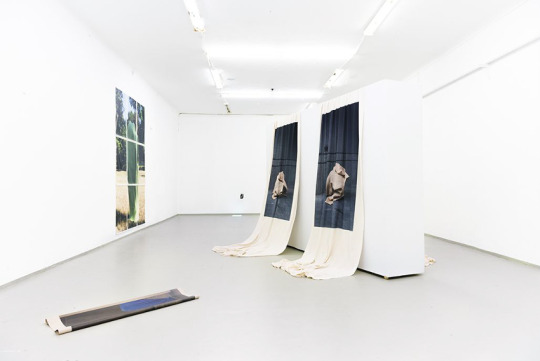
During her stay at Planta Alta, Kvet Nguyen continued her research project on the deconstruction of power structures during the 60s in former Czechoslovakia. In the 1960s Vietnam sent thousands of people to Europe to gain new skills that would build the war-torn country of the East. Former teacher Mosná from one of the Language Training Centres in Czechoslovakia kept a personal photo archive of her students. The people in the pictures were among the first Vietnamese migrants in Czechoslovakia. Through different archives, Kvet looks for answers that would reveal not only the presence of false internationalism (a power structure adopted in socialist countries similar to colonial practice) but also to explore how has this particular history changed the way we look at the other.
Kvet Nguyen (Hoa Nguyen Thi) graduated in 2021 from the Department of Photography and New Media at the Academy of Fine Arts in Bratislava, where she is currently pursuing her PhD studies. She is a laureate of the Tatra Banka Foundation 2021 Award in the Young Artist category. Her bachelor thesis Memoryless, borderdless, nameless space (2018) was awarded second place at the World Biennial of Student Photography in 2019, when it was also exhibited independently for the first time at the 15th edition of the festival [fjúžn]. She actively exhibits in Europe (Slovakia, Czech Republic, Poland, Hungary, France, Serbia, the Netherlands) as well as on other continents (Canada, Vietnam).
*
Durante su estancia en Planta Alta, Kvet Nguyen continuó su proyecto de investigación sobre la deconstrucción de estructuras de poder durante los años 60 en la antigua Checoslovaquia. En la década de 1960, Vietnam envió a miles de personas a Europa para adquirir nuevas habilidades que construirían el país del Este devastado por la guerra. Mosná, una antigua profesora de uno de los Centros de Enseñanza de Idiomas de Checoslovaquia guardaba un archivo fotográfico personal de sus estudiantes. Las personas en las fotos son algunos de los primeros inmigrantes vietnamitas en Checoslovaquia. A través de diferentes archivos, Kvet busca respuestas que no solo revelen la presencia del falso internacionalismo (una estructura de poder adoptada en los países socialistas similar a la práctica colonial) sino también para explorar cómo ha cambiado esta historia particular la forma en que miramos al otro.
Kvet Nguyen (Hoa Nguyen Thi) se graduó en 2021 del Departamento de Fotografía y Nuevos Medios de la Academia de Bellas Artes de Bratislava, donde actualmente está cursando sus estudios de doctorado. Fue galardonada con el Premio Tatra Banka Foundation 2021 en la categoría de Artista Joven. Su tesis Memoryless, borderdless, nameless space (2018) obtuvo el segundo galardón en la Bienal Mundial de Fotografía de Estudiantes en 2019, que también se exhibió de forma independiente por primera vez en la 15ª edición del festival [fjúžn]. Expone con frecuencia en Europa (Eslovaquia, República Checa, Polonia, Hungría, Francia, Serbia, Países Bajos) y en otros continentes (Canadá, Vietnam).
1 note
·
View note
Text
1980′s Camouflage of Socialist Countries
Eastern European style of camouflage had some variants for purposes. The camouflage was designed with 2-tone or 3-tone colors. Introduced in 1938, some snipers wore the earliest pattern of camouflage outfits.
In 1980′s, TTsKO or three-color camouflage uniform (pattern) and the later designed KLMK unifrom became the most ubiquitous designs in the USSR. The neighboring Poland also used some camouflage especially for the air borne and parachute special operation troops, with the three- or four-color spot pattern also nicknamed Żaba or "frog". (the country at that time was called PRL)
At the same time, China used the Type 81 as known as “big five leaves” (大五叶 ) pattern resembles American “Duck Hunter” design. Introduced in the mid- to -late 1970s, the uniforms would have seen service into the 1980s, including the Sino-Vietnamese War.
References: https://www.camopedia.org/index.php/Main_Page

1 note
·
View note
Text
Events 4.28 (after 1950)
1952 – Dwight D. Eisenhower resigns as Supreme Allied Commander of NATO in order to campaign in the 1952 United States presidential election.
1952 – The Treaty of San Francisco comes into effect, restoring Japanese sovereignty and ending its state of war with most of the Allies of World War II.
1952 – The Sino-Japanese Peace Treaty (Treaty of Taipei) is signed in Taipei, Taiwan between Japan and the Republic of China to officially end the Second Sino-Japanese War.
1965 – United States occupation of the Dominican Republic: American troops land in the Dominican Republic to "forestall establishment of a Communist dictatorship" and to evacuate U.S. Army troops.
1967 – Vietnam War: Boxer Muhammad Ali refuses his induction into the United States Army and is subsequently stripped of his championship and license.
1969 – Charles de Gaulle resigns as President of France.
1970 – Vietnam War: U.S. President Richard Nixon formally authorizes American combat troops to take part in the Cambodian campaign.
1973 – The Dark Side of the Moon by Pink Floyd, recorded in Abbey Road Studios goes to number one on the US Billboard chart, beginning a record-breaking 741-week chart run.
1975 – General Cao Văn Viên, chief of the South Vietnamese military, departs for the US as the North Vietnamese Army closes in on victory.
1977 – The Red Army Faction trial ends, with Andreas Baader, Gudrun Ensslin and Jan-Carl Raspe found guilty of four counts of murder and more than 30 counts of attempted murder.
1978 – The President of Afghanistan, Mohammed Daoud Khan, is overthrown and assassinated in a coup led by pro-communist rebels.
1986 – High levels of radiation resulting from the Chernobyl disaster are detected at a nuclear power plant in Sweden, leading Soviet authorities to publicly announce the accident.
1988 – Near Maui, Hawaii, flight attendant Clarabelle "C.B." Lansing is blown out of Aloha Airlines Flight 243, a Boeing 737, and falls to her death when part of the plane's fuselage rips open in mid-flight.
1994 – Former Central Intelligence Agency counterintelligence officer and analyst Aldrich Ames pleads guilty to giving U.S. secrets to the Soviet Union and later Russia.
1996 – Whitewater controversy: President Bill Clinton gives a 41⁄2 hour videotaped testimony for the defense.
1996 – Port Arthur massacre, Tasmania: A gunman, Martin Bryant, opens fire at the Broad Arrow Cafe in Port Arthur, Tasmania, killing 35 people and wounding 23 others.
2004 – CBS News released evidence of the Abu Ghraib torture and prisoner abuse. The photographs show rape and abuse from the American troops over Iraqi detainees.
0 notes
Text
Interesting idea for a video game I’d like to see:
Sino-Vietnamese war.
0 notes